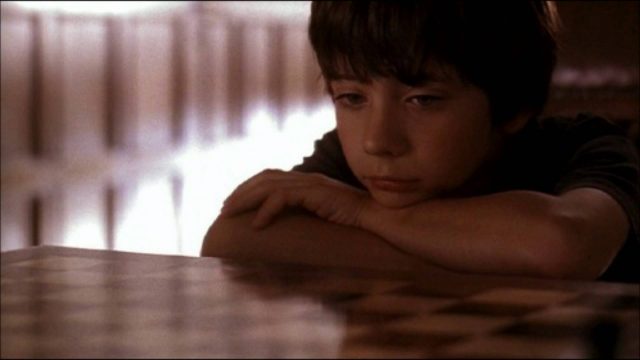Searching for Bobby Fischer is a certain type of movie that I saw a lot as a kid. It’s a movie that’s about children, but isn’t necessarily for them. It’s rated PG, but that has more to do with a lack of sex and violence than it does a guideline of who the audience should be.¹ HBO played it repeatedly, so I saw it repeatedly.
The story goes something like this: The Waitzkins (Joan Allen and Joe Mantegna) discover that their young son Josh (Max Pomeranc) has a gift for chess. He plays the hustlers in Washington Square Park (Laurence Fishburne, primarily) before his parents decide to nurture his gift with chess tutor Bruce Pandolfini (Ben Kingsley). Pandolfini gives young Josh the traditionalist, academic approach, where Vinnie (Fishburne) gives him the “play from your gut” instinctual perspective.
Initially, Josh has fun playing chess; he makes friends at tournaments, he wins easily. As the ranks get higher and stakes are raised, he is confronted with the possibility of losing. Losing in this case, is not just losing a tournament, but potentially losing the affection of his father. You see, Fred (Mantegna) is a sports writer and sees the world through that lens. Josh is able to connect with his father because he’s finally doing something that speaks to Fred in his terms. Fred understands tournaments and winning. Josh understands chess.
Pandolfini even gets in on the action; in trying to motivate his young pupil to win, he ends up committing what would probably be seen these days as child abuse. It’s one thing to really mentally push an adult (or even a teen at the top competitive level), but when you do it to a seven-year old, it’s grotesque.
There are a lot of adults in Searching for Bobby Fischer who really should know better. Everyone is competing with each other to exert the most influence on Josh’s gift, leaving Josh in a four-way struggle between his parents, Vinnie and Pandolfini. A simple read on that situation would be that each is trying to claim credit for his wins, but that’s not what’s happening. The motivations are coming from a much purer place, which makes the tension much more heart-rending. The motherly support and protection of her son. The love of the game. The love of mentorship. The love of winning.
If any of this sounds familiar, it’s because it probably is. This movie is tropey as hell. They’re all here: the father-son connecting story, the old-school vs. new-school teacher story, the child prodigy story. The sports story. What Searching for Bobby Fischer does well is take all of these threads, pull them together in a world that’s rarely shown in film, and populate it with really wonderful performances. Hell, Laura Linney does a great job even though her two minutes of screen time amount to getting berated by Joe Mantegna for her ignorance.
If there’s a technical aspect to this film that deserves recognition, it’s the sound design. With every click of the timer and clack of the pieces on the board, the soundtrack has booms with deep reverberations, as if every action is taking place in a much larger space. If you close your eyes during the tournament scenes, the the rhythm and timbre of the chess moves sound more like basketballs in Madison Square Garden than pawns in a church basement.
This attention to sound translates to dialogue as well. As Josh remembers back to previous lessons learned from the Adults Who Should Know Better, the soundtrack ping pongs between speakers to really put you inside the head of a kid who’s just trying to figure it all out.
When I saw this movie as a child, I identified very strongly with Josh. I have only a passing interest in chess, but a lot of the conversations surrounding gifted children rang very true. In the middle of the movie Josh makes the following observation:
“Maybe it’s better not to be the best. Then you can lose and it’s okay.”
That line will always break my heart. Not because of the construction or delivery, but because I can revisit the same thought process that led me to the same conclusion at a similar age.
Rewatching this film as an adult with young children, I tend to see it through the eyes of the elder Waitzkins. I understand that very instinctual drive to support and promote any activity that your child expresses an interest in. As a nine year old, I thought, “Who hires a chess coach for their kid? It’s not like it’s voice lessons or something.” As a 33 year old, I would. I would 100% hire a chess coach for my children.
Just, you know, one that isn’t so hell-bent on winning.
¹Now that I think of it, if someone were to make a sexy, violent movie set in the world of high-stakes chess, I would love to see it.

